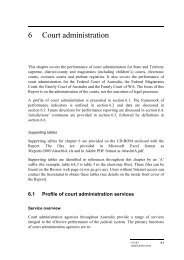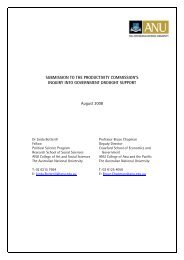Innovation & Business Skills Australia - Productivity Commission
Innovation & Business Skills Australia - Productivity Commission
Innovation & Business Skills Australia - Productivity Commission
Create successful ePaper yourself
Turn your PDF publications into a flip-book with our unique Google optimized e-Paper software.
thirds of the respondents to our survey said that it was difficult to find applicants with<br />
the right mix and level of skills (p.17).<br />
IBSA agrees with the factors affecting the attractiveness of employment in the VET<br />
sector outlined on page 19 of the <strong>Commission</strong>’s paper but would emphasise that, in<br />
relation to pathways into the sector, VET practitioners/professionals have an<br />
appropriate level of and experience in vocational competencies, whether or not these<br />
are recognised by actual qualifications. For example, there is evidence to suggest<br />
that people undertaking the Certificate IV in Training and Assessment with no<br />
vocational competencies will have more difficulty in completing that qualification than<br />
those with stronger vocational experience (NCVER, 2009, Clayton B. et.al.<br />
Practitioner expectations and experiences with the Certificate IV in Training and<br />
Assessment (TAA04104)).<br />
IBSA stresses the need to provide a range of ongoing professional development<br />
opportunities to VET practitioners/professionals, which, in our view is the<br />
responsibility of both employers and employees. Both should make time and<br />
resources available, especially for a sector whose rationale is the achievement of<br />
workplace standards, which implies currency in knowledge and skills.<br />
Enhancing workforce capability<br />
The standards of the <strong>Australia</strong>n Quality Training Framework (AQTF) in requiring<br />
people who train and assess in the VET sector to have a combination of vocational<br />
and education skills is a judgement born of the desire to provide a VET sector of high<br />
quality, which meets the needs of industry in terms of achieving workplace standards<br />
and individuals in terms of providing skills recognition and mobility. The Certificate<br />
IV in Training and Assessment is now more clearly an entry level qualification, the<br />
requirements of which are not overly onerous. In IBSA’s judgement, there is no<br />
trade off between vocational and education skills, the skills are symbiotic. As we<br />
argued above, the quality of teaching/training remains the most important<br />
contribution to good learner outcomes.<br />
In developing the recently endorsed Certificate IV in Training and Assessment<br />
(TAE40110), IBSA readily acknowledged that the qualification does not provide all<br />
the knowledge and skills which many practitioners need, but does provide the<br />
essential foundations on which further skills and knowledge can be built, through on<br />
the job experience, further learning or both. For this reason, IBSA is now revising<br />
the Diploma of Training and Assessment, which in our view is increasingly a skill<br />
requirement for many VET practitioners/professionals.<br />
Increasing the entry standard, as raised in the <strong>Commission</strong>’s paper, would not in our<br />
view necessarily produce better student learning outcomes. What we would<br />
advocate, and what we shall attempt to provide in the forthcoming period, is a range<br />
of professional development opportunities for the VET workforce. For some, the<br />
Certificate IV entry level qualification will be adequate, for many others a higher level<br />
qualification such as the Diploma, which provides advanced training and assessment<br />
opportunities, may be required. Other, more specialist qualifications such as the<br />
9

















